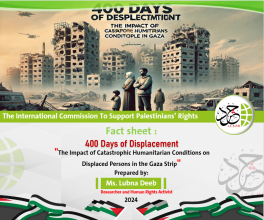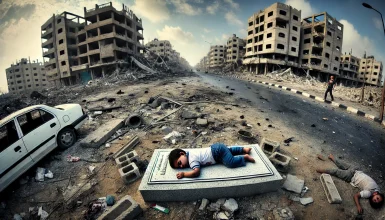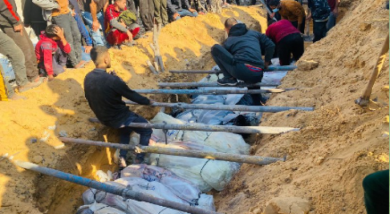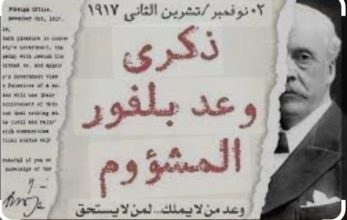
Clare Maxwell
Naimeh Shamlawi missed her youngest son more than ever during Ramadan, which concluded earlier this month.
Ali, 19, has spent the last three years in Israeli military detention on attempted murder charges. Israeli prosecutors claim that he and four friends threw rocks at an Israeli settler’s car, causing a crash that resulted in the death of a young Israeli girl.
Though they took a plea deal, Ali and his friends, known as the Hares Boys, have maintained their innocence throughout their trial and incarceration.
The evidence against them, they say, was based on “confessions” extracted under torture. But that’s small comfort to their mothers who say they felt the loss acutely every time the rest of the family gathered to break the Ramadan fast.
Naimeh, who has been permitted see her son only twice a month, is determined to spend every moment she can with him even though it means a six- or seven-hour journey for a 45-minute visit.
“The last time I saw my son, he told me not to come during Ramadan, because the journey would be too difficult while I am fasting,” Naimeh recalled. “But how can I leave him, especially now?”
Unfortunately for the Shamlawis, as well as thousands of other Palestinian families who have loved ones in Israeli military prisons — according to Addameer, a prisoner advocacy group, as of May 2016 there were a total of 7,000 Palestinian political prisoners in Israeli detention — the opportunities to visit are about to be drastically reduced.
Halving visiting time
In late May, the International Committee of the Red Cross (ICRC) announced that it was reducing coordinated visits between adult male Palestinian prisoners and their families from the West Bank by 50 percent, starting in July.
Families of prisoners from Gaza are exempted.
The announcement has worsened already fraught relations between Palestinian prisoner advocacy groups and the ICRC, but the latter shows no sign of relenting.
The rationale, according to Nadia Dibsy, a public relations officer with the ICRC in Jerusalem, is due to a decrease in the number of families showing up for scheduled visits. Based on the number of those participating in the program, the ICRC does not have the budget or personnel necessary to support twice-monthly visits, she said.
“Following an in-depth assessment, the ICRC decided independently that the second visit per month that it is currently facilitating will continue to be provided only for minors and female detainees.
“This decision is based on the fact that in the last few years, we have noted a clear decrease in the number of people showing up for these visits. This concern was communicated repeatedly in the last years to the families, the detainees and the authorities.”

Naimeh and her family, however, rely on the ICRC to help with travel permit applications, coordination with the Israel Prison Service, and buses to take families from the West Bank into Israel, which they are restricted from entering without a permit, and on to faraway prisons such as the Ramon prison in the Naqab desert where Ali is currently being held.
Without the buses, the cost of traveling to Ramon could cost approximately $250 per visit, according to the family. Obtaining the necessary permit to cross into Israel in the first place becomes much more difficult without ICRC support.
The ICRC has worked with Palestinian prisoners in Israeli detention — most of whom are convicted for political reasons — since 1948. The prison visit program started in 1968 and has remained one of its most important human rights programs in Israel and the occupied West Bank and Gaza Strip.
The organization’s role there is governed by the Fourth Geneva Convention, which stipulates that it is illegal for an occupying power like Israel to transport prisoners out of occupied territory such as the West Bank.
Yet out of 19 Israeli detention centers that hold Palestinian prisoners, just one is located within the West Bank. Ensuring prisoners incarcerated in Israel have the same visitation rights they would enjoy if they were held in facilities in the West Bank becomes a matter of upholding their rights under international law.
Fraught relations
Already on every Tuesday, a coalition of prisoner support groups holds a sit-in outside the ICRC offices in the West Bank city of Ramallah to push for action on a number of issues. And since the decision to reduce the number of visits was announced, the coalition has included a demand for twice-monthly visits on their agenda.
Samidoun activists in New York City have also staged a protest outside the ICRC offices there, demanding that the program of visits continue as is.
For its part, the ICRC is adamant that it has been communicating with families, detainees and advocacy groups over the possibility of reducing visits.
Yet representatives from prisoner rights groups insist that the announcement came as a surprise to them. Communications with the ICRC have fallen to the point, they say, that they depend on weekly protests to relay their demands. And disappointment with the decision among the protesters during one recent visit was palpable.
“Our work is the same as the Red Cross,” said Khitaan Saafin, who works with the Union of Palestinian Women and is a regular protester outside the ICRC offices in Ramallah. “But they do not respond to us.”
Ali Shamlawi is due to spend another 12 years in prison. His mother will be 69 by the time he is released. Naimeh is afraid she won’t be alive then. For her, every moment they can spend together is precious, even if it is in an Israeli prison, surrounded by guards and with a plate glass window between them.
She’s already lost a lot of time with her son; now she is losing even more to bureaucracy.
Still, she will take what she can get. Even if they can only spend a total of nine hours a year together, they’ll make the most of it.
“I will spend every minute with him,” Naimeh said.





